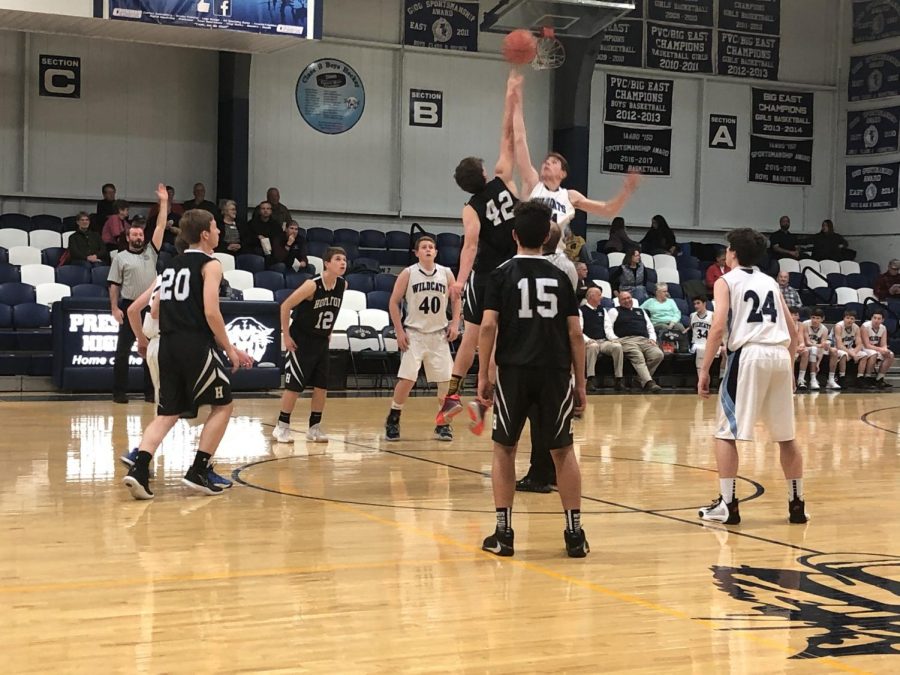Arbitrary Restrictions, Why Do They Exist?
Some guidelines and restrictions are clearly necessary for the safety of those in and around sporting events. But at what point do these new rules shift from necessary to arbitrary?
A JV boys basketball game between Presque Isle and Houlton tips off on December 11th of 2019. This season, given the undoing pandemic, the MPA has decided to eliminate the tip off in favor of a coin toss to decide possession. “It’s going to be so different doing a coin toss,” said senior Hattie Bubar. “I feel like it’s not the same without a tip off.
December 2, 2020
In the past few months, sports at all levels have resumed play. Now, numerous restrictions exist for the safety of both the players and their families in an attempt to ensure at least some normalcy remains in our ever changing lives.
There comes a point, however, where you have to take a step back and look out upon the restrictions being imposed and ask yourself, “Do these really make sense?” There’s a fine line between necessary and arbitrary, and the rule makers have been treading that line like a drunk driver 17 pints deep.
In the past few weeks, we’ve seen the release of the guidelines for the upcoming winter sports season, headlined by the decision to eliminate the start of game jump ball and replace it with a coin toss.
While this rule will ultimately not have that big of an impact upon the outcome of the game, it begs the question of “Why?” If it’s how the players are positioned that worries them, it’s not like the same scenario won’t happen dozens of times over the course of a contest. Any time an athlete goes up for a layup or pulls up for a jump shot with someone defending them, that same close contact will occur. More than likely, the same two players taking the jump ball will be defending each other during course of the game, and with that, as they are presumably the team’s tallest starters, and will have the most close contact of any matchup on the floor because of this, spending most of their time on the court in the post. This makes the elimination of the tip rather useless and arbitrary.
“Honestly, I think it’s ridiculous,” said Jeff Hudson, veteran head coach of the girls varsity basketball team. “It’s one play out of the [entire] game, in the rest of the game we’re going to be trying to stop each other, probably in a more physical manner than people think. It’s basketball, it’s a physical game, I think it’s foolish to get rid of that one play with all the other stuff we have to do [over the course of a game].” Senior player Hattie Bubar echoed Hudson’s comments. “We’re going to be guarding each other the whole game. What difference is a tip off going to make?” said Bubar.
This is just an example of one of the several surface level rules proposed/enforced thus far by the MPA this school year that don’t provide any real safety benefit.
Take the removal of slide tackling from this past soccer season. There is perhaps more potential for transmission without it in the game. The intention behind the rule was “to avoid tripping or falling on top of one another,” but ultimately, the vast majority of slide tackles originate from the side, rather than in front or behind the attacking player, so the likelihood of one player falling upon the other, at least in a manner where an athlete would breath on or in the direction of another, was slim. Instead, defending in a situation that would normally entail a slide tackle caused much more shoulder-to-shoulder, close face contact, which is exactly what they are trying to avoid.
In ice hockey, a rule they chose to carry over from soccer regarding mouth guards states, “Student-athletes should keep their mouth guards in their mouth throughout the competition. If the mouth guard is taken out, a player must wash or sanitize their hands before continuing to play.” I understand the basis behind this rule is to stop the potential spread of saliva from a mouth guard, but I don’t think any thought actually went into the implementation and enforcement of it in the sport of hockey. First of all, given the fact that all athletes have to wear face coverings over the entirety of the game, how exactly would an official have any gauge of whether or not players are wearing mouth guards in the first place? And second, what is the point of sanitizing and/or washing one’s hands after handling a mouth guard if that hand is going directly back into a glove that allows for no exposure to other surrounding individuals?
Presque Isle Athletic Director Mark White understands the gripes with the restrictions, but says that at the end of the day, it’s ultimately about allowing the athletes to compete. “I’m all for anything that gets kids back on the slopes, on the ice, on the basketball court, or cheering, whatever we have to do (to reach that outcome),” said White. “There’s a point where the MPA and the schools have got to do these things just to play. 2020-2021 does not set any precedent for future years. The MPA and the high schools, and the AD’s know how important it is for kids to get out and play, so if it means we have to adjust the rules of the game for this time period, I don’t have a problem with that. We’re trying very hard not to impact the sport, and we’ve got to understand that we have to find that line between “when is the game not the game anymore?” And so far we haven’t gotten to that point. (Of note, White was not a part of the decision making process for the aforementioned tip off elimination rule, as he is not a member of that committee.)
I’m aware that they’re trying to keep the sports safe and allow athletes to play. But there have been some head scratching choices in regards to rule changes that have made me question the knowledge and thought that have gone into these decisions, and wonder if this process is truly in the right hands.

